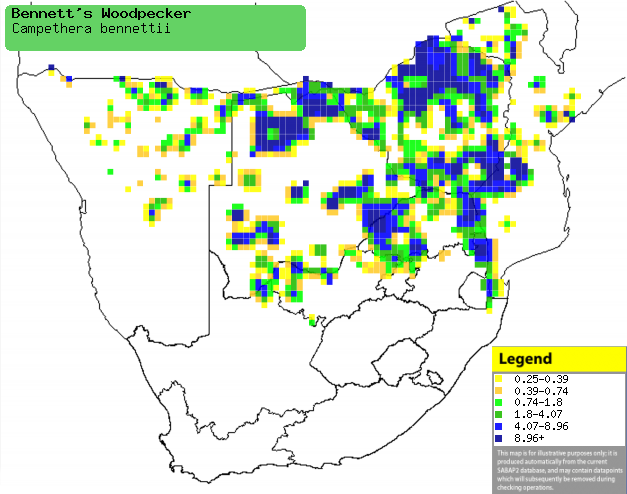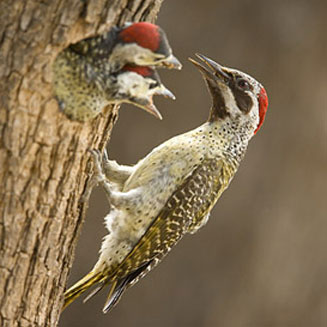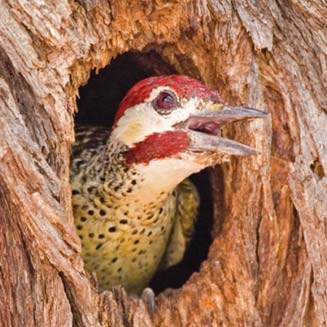|
Campethera bennettii (Bennett's
woodpecker)
Bennettse speg [Afrikaans]; Mbangura (generic term for
woodpecker and also applied to Crested barbet) [Kwangali]; Hohodza (generic name
for woodpecker) [Shona]; Inconcodzi (generic for woodpeckers) [Swazi];
Ghongoswana (generic term for woodpecker) [Tsonga]; Kôkômere, Phaphadikôta
[Tswana]; Bennett-specht woodpecker [Dutch]; Pic de Bennett [French];
Bennettspecht [German]; Pica-pau de Bennett [Portuguese]
Life
> Eukaryotes >
Opisthokonta
> Metazoa (animals) >
Bilateria >
Deuterostomia > Chordata >
Craniata > Vertebrata (vertebrates) > Gnathostomata (jawed
vertebrates) > Teleostomi (teleost fish) > Osteichthyes (bony fish) > Class:
Sarcopterygii (lobe-finned
fish) > Stegocephalia (terrestrial
vertebrates) > Tetrapoda
(four-legged vertebrates) > Reptiliomorpha > Amniota >
Reptilia (reptiles) >
Romeriida > Diapsida > Archosauromorpha > Archosauria >
Dinosauria
(dinosaurs) > Saurischia > Theropoda (bipedal predatory dinosaurs) >
Coelurosauria > Maniraptora > Aves
(birds) >
Order: Piciformes
> Family: Picidae
The Bennett's woodpecker is found from Tanzania south to
southern Africa, where it occurs in deciduous woodland and savanna with tall
trees. It feeds mainly on ants, their their eggs and pupae, foraging for them by
excavating underground ant nests, scooping them up with its sticky tongue. It
uses cavities in trees as nests, making it themselves are using pre-existing
holes. It lays 2-6 eggs, which are incubated by both sexes, for 15-18 days. The
chicks stay in the nest for 26-27 days, after which they remain dependent on
their parents until the next breeding season.
Distribution and habitat
Occurs from Tanzania south to
Botswana, Zimbabwe, north central Namibia, Mozambique and north-eastern South
Africa. It generally prefers
deciduous woodland and savanna with tall trees, especially with Broad-leaved miombo
(Brachystegia), Zambezi teak (Baikiaea plurijuga) and Burkea (Burkea
africana).
|
 |
|
Distribution of Bennett's woodpecker in southern Africa,
based on statistical smoothing of the records from first SA Bird Atlas
Project (©
Animal Demography unit, University of
Cape Town; smoothing by Birgit Erni and Francesca Little). Colours range
from dark blue (most common) through to yellow (least common).
See here for the latest distribution
from the SABAP2. |
Food
Feeds mainly on ants, their
eggs and pupae, doing most of its foraging by excavating underground ant nests, scooping them
up with its sticky tongue. It also eats beetles and termite alates. The
following food items have been recorded in its diet:
Breeding
- It uses cavities in trees as nests, either made by the breeding pair or by
other woodpeckers (such as the Bearded
woodpecker); the latter is more commonly recorded.
 |
 |
|
Bennett's woodpecker female at its nest to feed chicks,
Sericea farm, South Africa. [photo Warwick Tarboton ©] |
Bennett's woodpecker male peering out of its nest entrance. [photo
Neil Gray
©] |
- Egg-laying season is from August-February, peaking from
October-December.
- It lays 2-6 eggs, which are incubated by both sexes for 15-18 days.
- The chicks stay in the nest for 26-27 days, after which they remain
dependent on their parents until the next breeding season.
Threats
Not threatened.
References
-
Hockey PAR, Dean WRJ and Ryan PG (eds) 2005. Roberts
- Birds of southern Africa, VIIth ed. The Trustees of the John Voelcker
Bird Book Fund, Cape Town.
|
